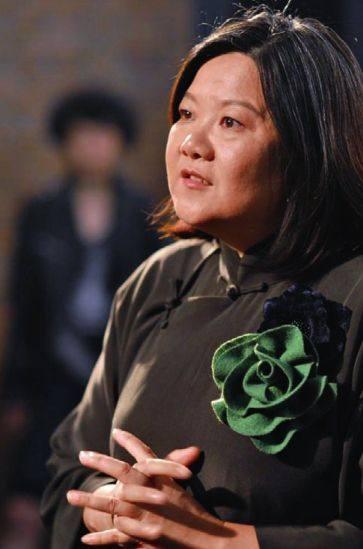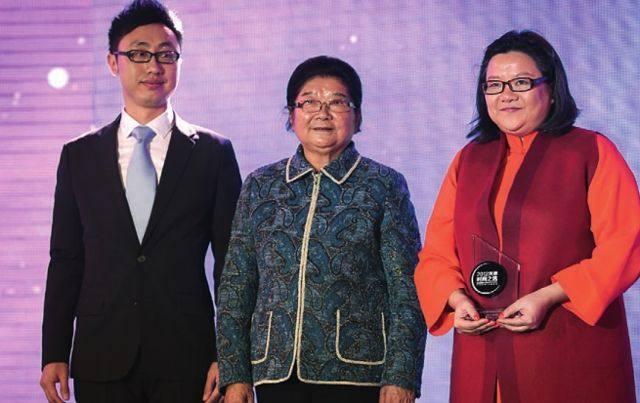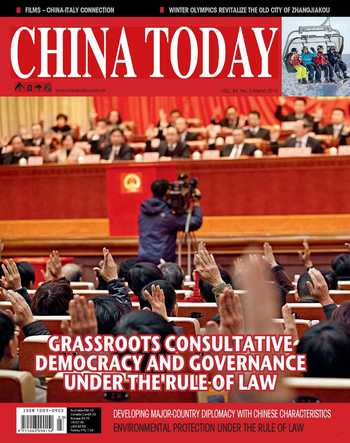Hong Huang:Promoter of Traditional Culture through Fashion
By staff reporter LI YUAN


I met Hong Huang in a forum on the development of national culture. A leading figure in Chinese fashion circles, Hong strives to create new opportunities for the nations traditional handicrafts industry.
Born into a prominent family, Hong gives the impression of being sociable and straightforward. Over decades, she has ventured into website operation and magazine publications. She also heads the Gehua Design Center. All of her works are aimed at developing Chinese design and helping Chinese designers to adapt to the market-driven world.
Promoter of Chinese Culture
Hong Huang was born in 1961. Her grandfather was a noted scholar; her mother was Mao Zedongs English teacher.
In 1974, China sent a group of school children to study in the U.S. Hong Huang was among them and started her life abroad at the age of 12. Several years later, after obtaining a degree in politics at Vassar College, she began her career at Kamsky Associates Inc. Later, she was sent to Beijing by German company Metallgesellschaft AG as its chief representative in China.
However, in 1996, Hong resigned from the well-paid position and invested in a publishing house with some of her friends. Her company produced three fashion magazines – iLook, Seventeen and Time Out Beijing. All of the investors were Chinese returning from abroad with aspirations to contribute to Chinese culture.
“Of course, its necessary to earn money to survive. But when I am old, I hope I can tell my grandchildren that Im proud of what Ive accomplished, rather than just saying I became a millionaire,”Hong Huang said. “Im not saying that money is bad, but Im more interested in the ways we make money.”
Hong Huang chose not to be confined by her family background. “I used to put myself under considerable pressure. But I gradually realized one thing: even if Im not as successful as my family members, it does not mean Im a failure. Ive been
living my life in my way.”
Building Platforms for Chinese Designers
Its not easy to describe Hong Huang. She is a celebrity, a writer, a businesswoman, a journalist, and a fashion leader. She is also the“Oprah Winfrey of China,”according to The Wall Street Journal. Hong Huangs iLook is the only Chinese periodical to focus on local designers. Since its revision in 2006, the magazine has presented nearly 100 Chinese designers to readers. In addition to fashion, iLook also promotes a modern Chinese lifestyle and Chinese cultural values. According to Hong, iLook attempts to discover a new and better way of life which can raise the confidence of Chinese people and strengthen their sense of mission.
Producing the magazines gives Hong Huang a chance to meet more Chinese designers. She found that what local designers need most is a platform to help them gain market experience. So she invested in a store called BNC (Brand New China) to promote local designers works. The store has a more interesting name in Chinese – Peppermint?Rice?Spring Onion.
Covering an area of 540 square meters, the BNC store sells all sorts of products – from clothing and accessories to houseware – designed by more than 150 Chinese designers who are still little known.
“The styles of these works might not be accepted by everyone. But I try to avoid personal judgment,” Hong commented. “The most important thing is to be responsible to our consumers. So, the only criterion for my store is quality.”
Art works are usually disconnected from realities. But Hong Huang said that Chinese designers today are designing in a more pragmatic style. “Every week we draw up a sales analysis report for our designers who are always eager to know about their market performance. In fact, they are very concerned about the market.”
Hong Huang is not trying to make high profits in the BNC store. She simply hopes to present as many original products as possible, and realize sustained development. “Survival is our top priority at the moment. It doesnt mean anything if we calculate how much profit weve generated. I expect BNC to expand to other Chinese cities besides Beijing and even abroad.” Hong Huang has a dream that one day Chinese fashion brands will be seen in New York, Paris, Milan and all around the world.
Inherit Culture through Fashion
Hong Huang acknowledges that she is not a brilliant businesswoman, because profit is never her primary goal.“I need to know that what I am doing is meaningful. I hope my colleagues can share my enthusiasm for Chinese local design,” Hong said. “I think its hard to say whether Im a businesswoman or a cultural ambassador. I personally place myself between these two categories and kind of enjoy staying in between.” She prefers to describe herself as “a highly literate person in fashion circles and the most fashionable one in the academic world.”
Hong Huang believes that fashion is a part of culture while culture is a part of the values of a society. In the past two decades, fashion concepts in China were completely subject to Western values. Chinese designers had gone through a difficult time as they had to resist the lure of earning easy money through custom made garments for foreign clients.
However, the downturn in the West caused by the financial crisis of 2008 has pushed China to the fore of the fashion market. The fashion world has begun to notice independent Chinese designers. Last year, Vogue magazine selected Uma Wang as the first Chinese “Vogue Talent.” Exception de Mixmind, a Chinese fashion brand, now has more than 90 retail stores, generating an annual sales volume of nearly RMB 1 billion. Many domestic brands established by independent designers are also stepping into the mainstream market.
In Hongs eyes, the best inspirations always come from ordinary people. “We tend to find out what is trendy from celebrities, which is absolutely wrong.”She spoke highly of the efforts of Exception de Mixmind. “The success of this brand is not accidental. Although society as a whole is becoming materialistic, Exception de Mixmind is the opposite; while Chinese fashion is still largely dominated by extravagant Western styles, Exception de Mixmind highlights the modest and introspective qualities that Chinese people prefer. When topquality imported fabrics prevail in the Chinese market, Exception de Mixmind endeavors to make better use of humble Chinese cotton.”
Hong believes that passing down a culture means inheriting values. Innovation is creating new forms of expression based on these values. Without innovation, there is no possibility of inheritance; and innovation loses its basis without inheritance.

